Analysis of the Hospitality Industry: Skills, SWOT, and PESTEL
VerifiedAdded on 2021/02/18
|13
|3907
|40
Report
AI Summary
This report provides a comprehensive analysis of the hospitality industry, focusing on the skills required for various roles, including chefs, managers, and front office staff, and also addresses current skill shortages. It then delves into a PESTEL analysis, examining the political, economic, social, technological, environmental, and legal factors influencing the industry, with specific examples like the impact of Brexit and technological advancements. A SWOT analysis of IHG, a major hospitality company, is also included, highlighting its strengths, weaknesses, opportunities, and threats, and how this framework aids in decision-making. Finally, the report discusses current and potential trends within the hospitality sector, such as the increasing importance of customer experience and sustainability. The report concludes with a summary of the key findings and recommendations for the industry's future.
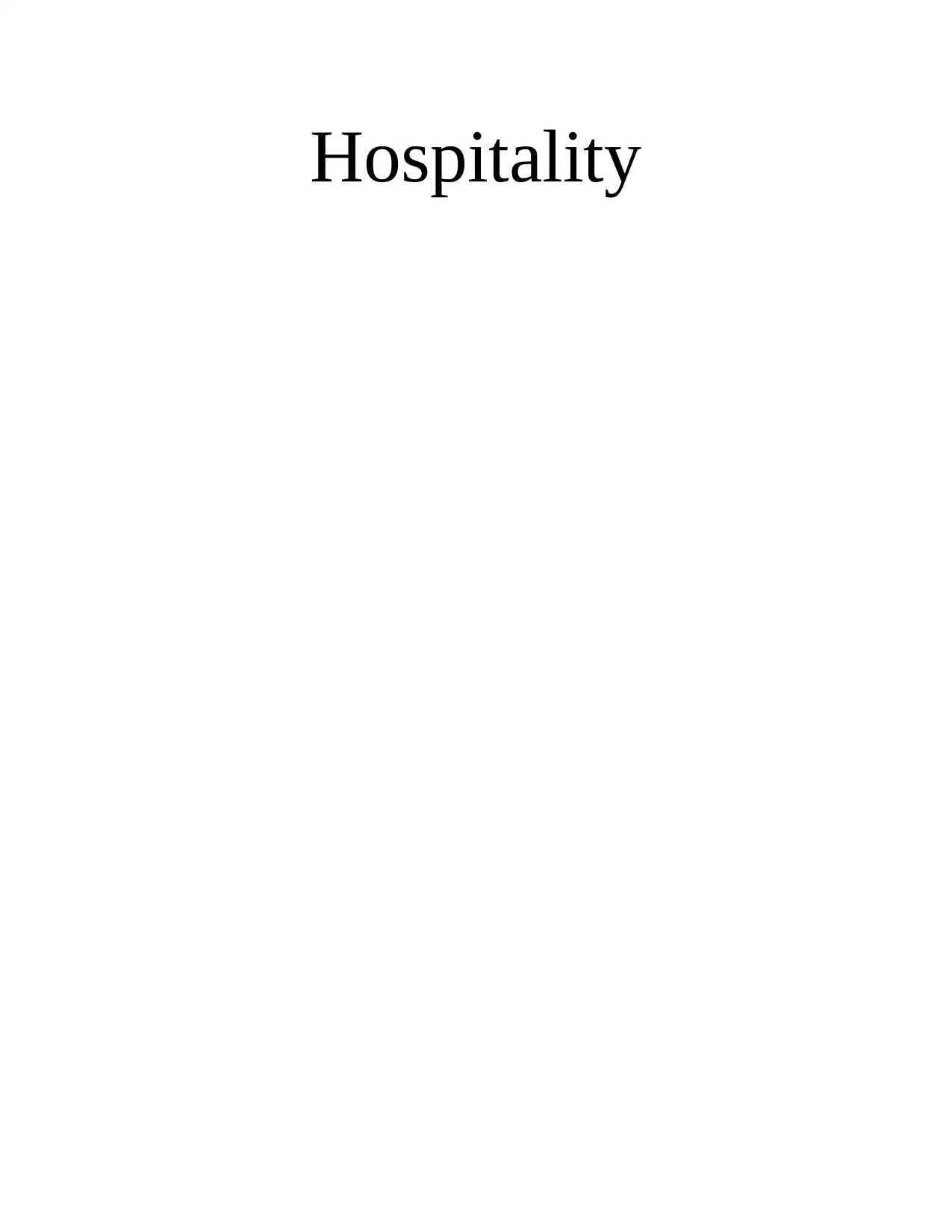
Hospitality
Paraphrase This Document
Need a fresh take? Get an instant paraphrase of this document with our AI Paraphraser
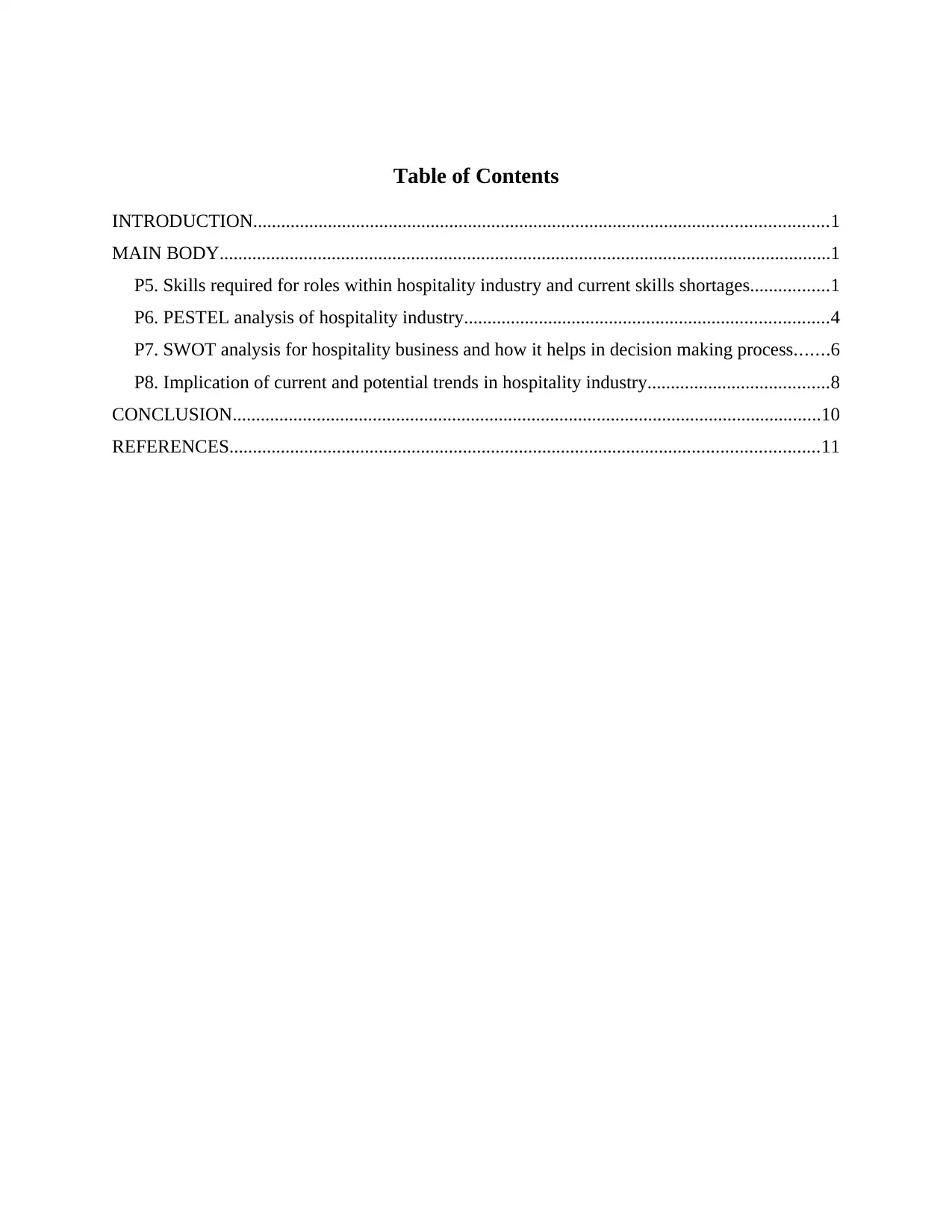
Table of Contents
INTRODUCTION...........................................................................................................................1
MAIN BODY...................................................................................................................................1
P5. Skills required for roles within hospitality industry and current skills shortages.................1
P6. PESTEL analysis of hospitality industry..............................................................................4
P7. SWOT analysis for hospitality business and how it helps in decision making process.......6
P8. Implication of current and potential trends in hospitality industry.......................................8
CONCLUSION..............................................................................................................................10
REFERENCES..............................................................................................................................11
INTRODUCTION...........................................................................................................................1
MAIN BODY...................................................................................................................................1
P5. Skills required for roles within hospitality industry and current skills shortages.................1
P6. PESTEL analysis of hospitality industry..............................................................................4
P7. SWOT analysis for hospitality business and how it helps in decision making process.......6
P8. Implication of current and potential trends in hospitality industry.......................................8
CONCLUSION..............................................................................................................................10
REFERENCES..............................................................................................................................11
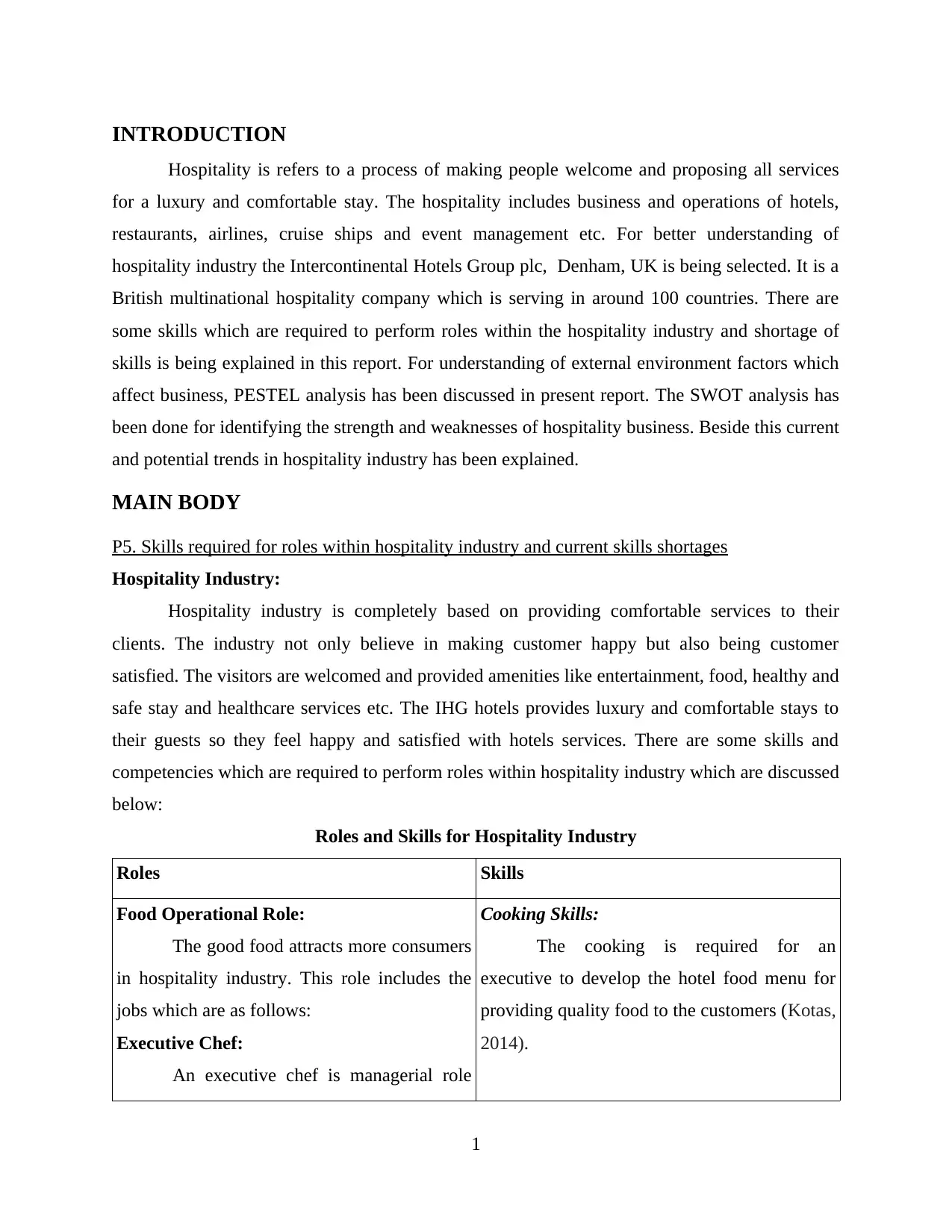
INTRODUCTION
Hospitality is refers to a process of making people welcome and proposing all services
for a luxury and comfortable stay. The hospitality includes business and operations of hotels,
restaurants, airlines, cruise ships and event management etc. For better understanding of
hospitality industry the Intercontinental Hotels Group plc, Denham, UK is being selected. It is a
British multinational hospitality company which is serving in around 100 countries. There are
some skills which are required to perform roles within the hospitality industry and shortage of
skills is being explained in this report. For understanding of external environment factors which
affect business, PESTEL analysis has been discussed in present report. The SWOT analysis has
been done for identifying the strength and weaknesses of hospitality business. Beside this current
and potential trends in hospitality industry has been explained.
MAIN BODY
P5. Skills required for roles within hospitality industry and current skills shortages
Hospitality Industry:
Hospitality industry is completely based on providing comfortable services to their
clients. The industry not only believe in making customer happy but also being customer
satisfied. The visitors are welcomed and provided amenities like entertainment, food, healthy and
safe stay and healthcare services etc. The IHG hotels provides luxury and comfortable stays to
their guests so they feel happy and satisfied with hotels services. There are some skills and
competencies which are required to perform roles within hospitality industry which are discussed
below:
Roles and Skills for Hospitality Industry
Roles Skills
Food Operational Role:
The good food attracts more consumers
in hospitality industry. This role includes the
jobs which are as follows:
Executive Chef:
An executive chef is managerial role
Cooking Skills:
The cooking is required for an
executive to develop the hotel food menu for
providing quality food to the customers (Kotas,
2014).
1
Hospitality is refers to a process of making people welcome and proposing all services
for a luxury and comfortable stay. The hospitality includes business and operations of hotels,
restaurants, airlines, cruise ships and event management etc. For better understanding of
hospitality industry the Intercontinental Hotels Group plc, Denham, UK is being selected. It is a
British multinational hospitality company which is serving in around 100 countries. There are
some skills which are required to perform roles within the hospitality industry and shortage of
skills is being explained in this report. For understanding of external environment factors which
affect business, PESTEL analysis has been discussed in present report. The SWOT analysis has
been done for identifying the strength and weaknesses of hospitality business. Beside this current
and potential trends in hospitality industry has been explained.
MAIN BODY
P5. Skills required for roles within hospitality industry and current skills shortages
Hospitality Industry:
Hospitality industry is completely based on providing comfortable services to their
clients. The industry not only believe in making customer happy but also being customer
satisfied. The visitors are welcomed and provided amenities like entertainment, food, healthy and
safe stay and healthcare services etc. The IHG hotels provides luxury and comfortable stays to
their guests so they feel happy and satisfied with hotels services. There are some skills and
competencies which are required to perform roles within hospitality industry which are discussed
below:
Roles and Skills for Hospitality Industry
Roles Skills
Food Operational Role:
The good food attracts more consumers
in hospitality industry. This role includes the
jobs which are as follows:
Executive Chef:
An executive chef is managerial role
Cooking Skills:
The cooking is required for an
executive to develop the hotel food menu for
providing quality food to the customers (Kotas,
2014).
1
⊘ This is a preview!⊘
Do you want full access?
Subscribe today to unlock all pages.

Trusted by 1+ million students worldwide
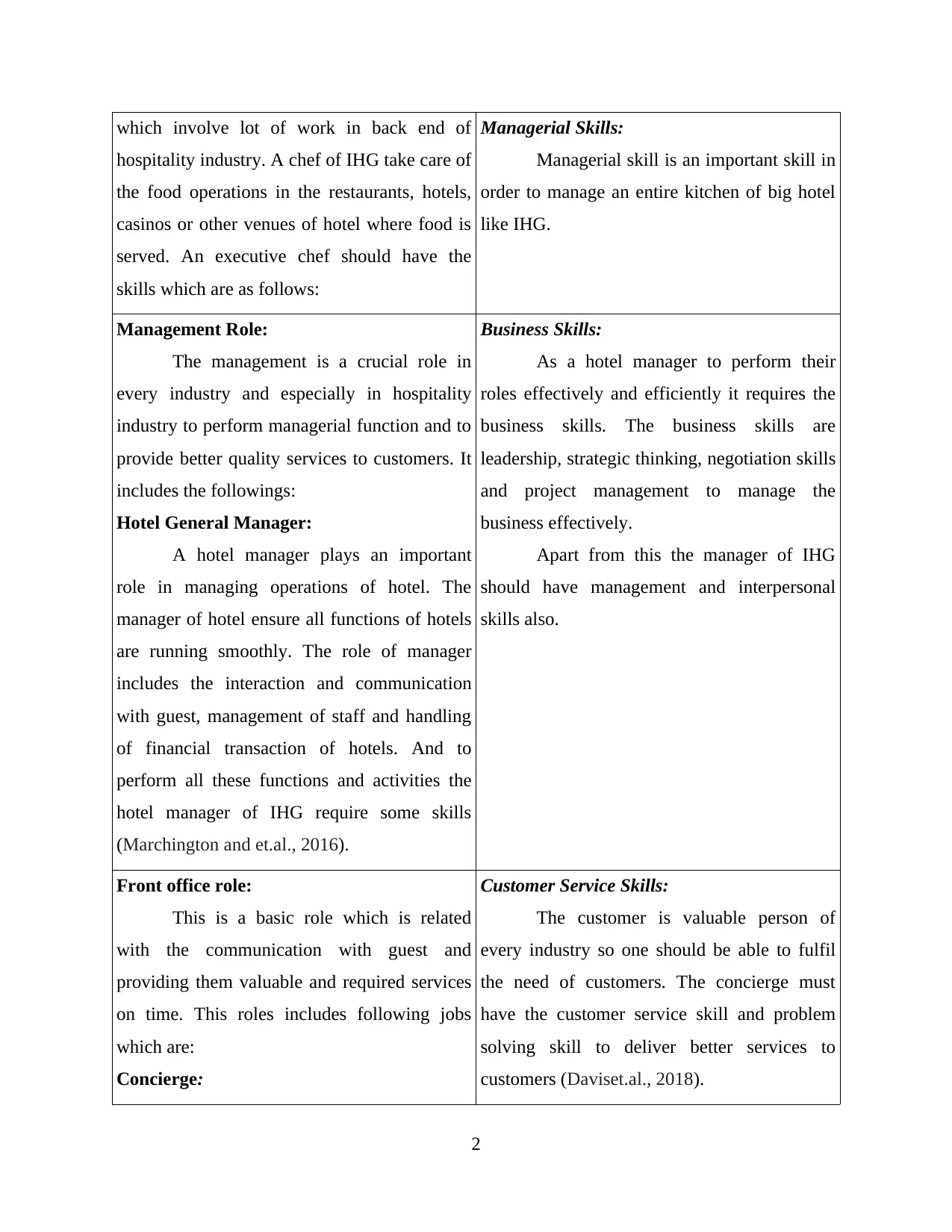
which involve lot of work in back end of
hospitality industry. A chef of IHG take care of
the food operations in the restaurants, hotels,
casinos or other venues of hotel where food is
served. An executive chef should have the
skills which are as follows:
Managerial Skills:
Managerial skill is an important skill in
order to manage an entire kitchen of big hotel
like IHG.
Management Role:
The management is a crucial role in
every industry and especially in hospitality
industry to perform managerial function and to
provide better quality services to customers. It
includes the followings:
Hotel General Manager:
A hotel manager plays an important
role in managing operations of hotel. The
manager of hotel ensure all functions of hotels
are running smoothly. The role of manager
includes the interaction and communication
with guest, management of staff and handling
of financial transaction of hotels. And to
perform all these functions and activities the
hotel manager of IHG require some skills
(Marchington and et.al., 2016).
Business Skills:
As a hotel manager to perform their
roles effectively and efficiently it requires the
business skills. The business skills are
leadership, strategic thinking, negotiation skills
and project management to manage the
business effectively.
Apart from this the manager of IHG
should have management and interpersonal
skills also.
Front office role:
This is a basic role which is related
with the communication with guest and
providing them valuable and required services
on time. This roles includes following jobs
which are:
Concierge:
Customer Service Skills:
The customer is valuable person of
every industry so one should be able to fulfil
the need of customers. The concierge must
have the customer service skill and problem
solving skill to deliver better services to
customers (Daviset.al., 2018).
2
hospitality industry. A chef of IHG take care of
the food operations in the restaurants, hotels,
casinos or other venues of hotel where food is
served. An executive chef should have the
skills which are as follows:
Managerial Skills:
Managerial skill is an important skill in
order to manage an entire kitchen of big hotel
like IHG.
Management Role:
The management is a crucial role in
every industry and especially in hospitality
industry to perform managerial function and to
provide better quality services to customers. It
includes the followings:
Hotel General Manager:
A hotel manager plays an important
role in managing operations of hotel. The
manager of hotel ensure all functions of hotels
are running smoothly. The role of manager
includes the interaction and communication
with guest, management of staff and handling
of financial transaction of hotels. And to
perform all these functions and activities the
hotel manager of IHG require some skills
(Marchington and et.al., 2016).
Business Skills:
As a hotel manager to perform their
roles effectively and efficiently it requires the
business skills. The business skills are
leadership, strategic thinking, negotiation skills
and project management to manage the
business effectively.
Apart from this the manager of IHG
should have management and interpersonal
skills also.
Front office role:
This is a basic role which is related
with the communication with guest and
providing them valuable and required services
on time. This roles includes following jobs
which are:
Concierge:
Customer Service Skills:
The customer is valuable person of
every industry so one should be able to fulfil
the need of customers. The concierge must
have the customer service skill and problem
solving skill to deliver better services to
customers (Daviset.al., 2018).
2
Paraphrase This Document
Need a fresh take? Get an instant paraphrase of this document with our AI Paraphraser
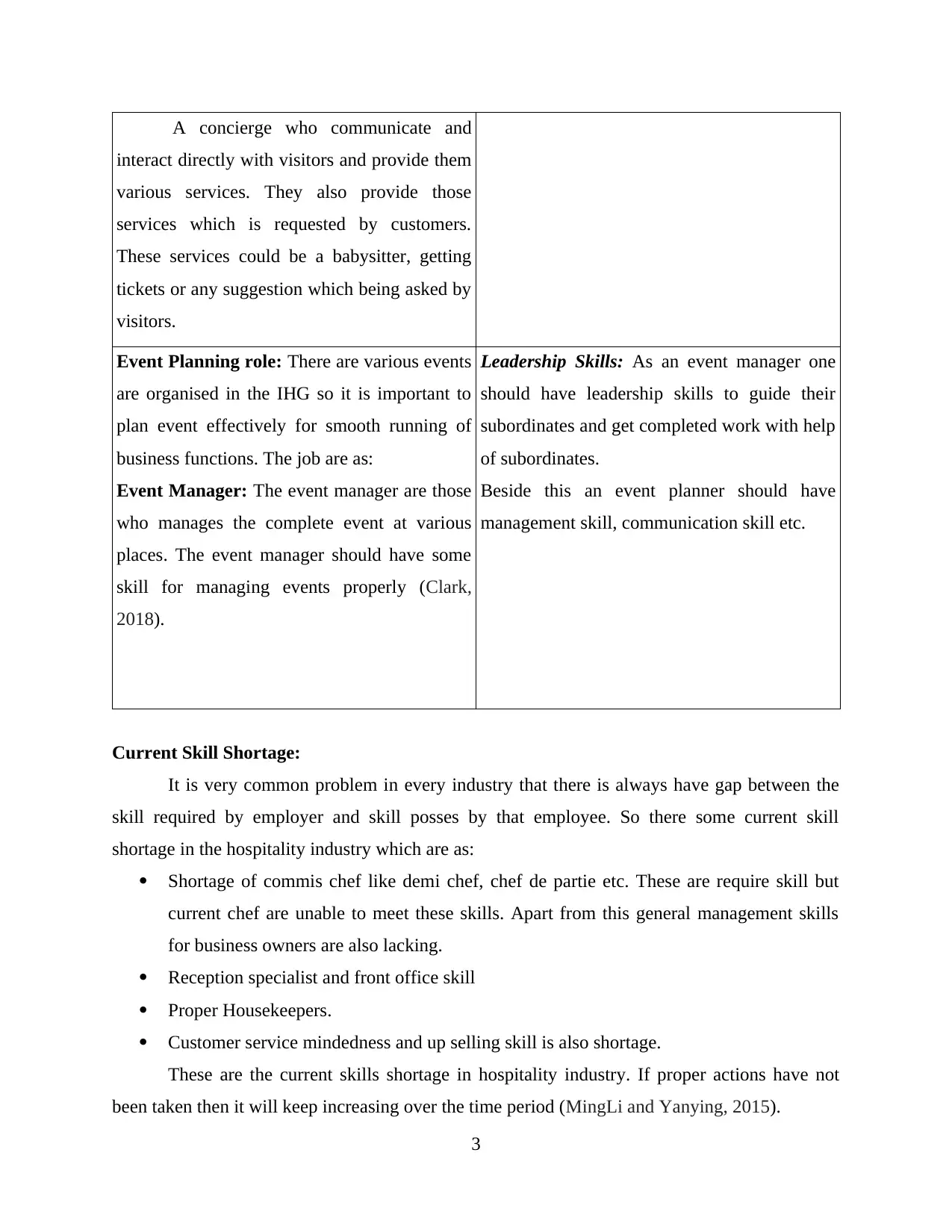
A concierge who communicate and
interact directly with visitors and provide them
various services. They also provide those
services which is requested by customers.
These services could be a babysitter, getting
tickets or any suggestion which being asked by
visitors.
Event Planning role: There are various events
are organised in the IHG so it is important to
plan event effectively for smooth running of
business functions. The job are as:
Event Manager: The event manager are those
who manages the complete event at various
places. The event manager should have some
skill for managing events properly (Clark,
2018).
Leadership Skills: As an event manager one
should have leadership skills to guide their
subordinates and get completed work with help
of subordinates.
Beside this an event planner should have
management skill, communication skill etc.
Current Skill Shortage:
It is very common problem in every industry that there is always have gap between the
skill required by employer and skill posses by that employee. So there some current skill
shortage in the hospitality industry which are as:
Shortage of commis chef like demi chef, chef de partie etc. These are require skill but
current chef are unable to meet these skills. Apart from this general management skills
for business owners are also lacking.
Reception specialist and front office skill
Proper Housekeepers.
Customer service mindedness and up selling skill is also shortage.
These are the current skills shortage in hospitality industry. If proper actions have not
been taken then it will keep increasing over the time period (MingLi and Yanying, 2015).
3
interact directly with visitors and provide them
various services. They also provide those
services which is requested by customers.
These services could be a babysitter, getting
tickets or any suggestion which being asked by
visitors.
Event Planning role: There are various events
are organised in the IHG so it is important to
plan event effectively for smooth running of
business functions. The job are as:
Event Manager: The event manager are those
who manages the complete event at various
places. The event manager should have some
skill for managing events properly (Clark,
2018).
Leadership Skills: As an event manager one
should have leadership skills to guide their
subordinates and get completed work with help
of subordinates.
Beside this an event planner should have
management skill, communication skill etc.
Current Skill Shortage:
It is very common problem in every industry that there is always have gap between the
skill required by employer and skill posses by that employee. So there some current skill
shortage in the hospitality industry which are as:
Shortage of commis chef like demi chef, chef de partie etc. These are require skill but
current chef are unable to meet these skills. Apart from this general management skills
for business owners are also lacking.
Reception specialist and front office skill
Proper Housekeepers.
Customer service mindedness and up selling skill is also shortage.
These are the current skills shortage in hospitality industry. If proper actions have not
been taken then it will keep increasing over the time period (MingLi and Yanying, 2015).
3
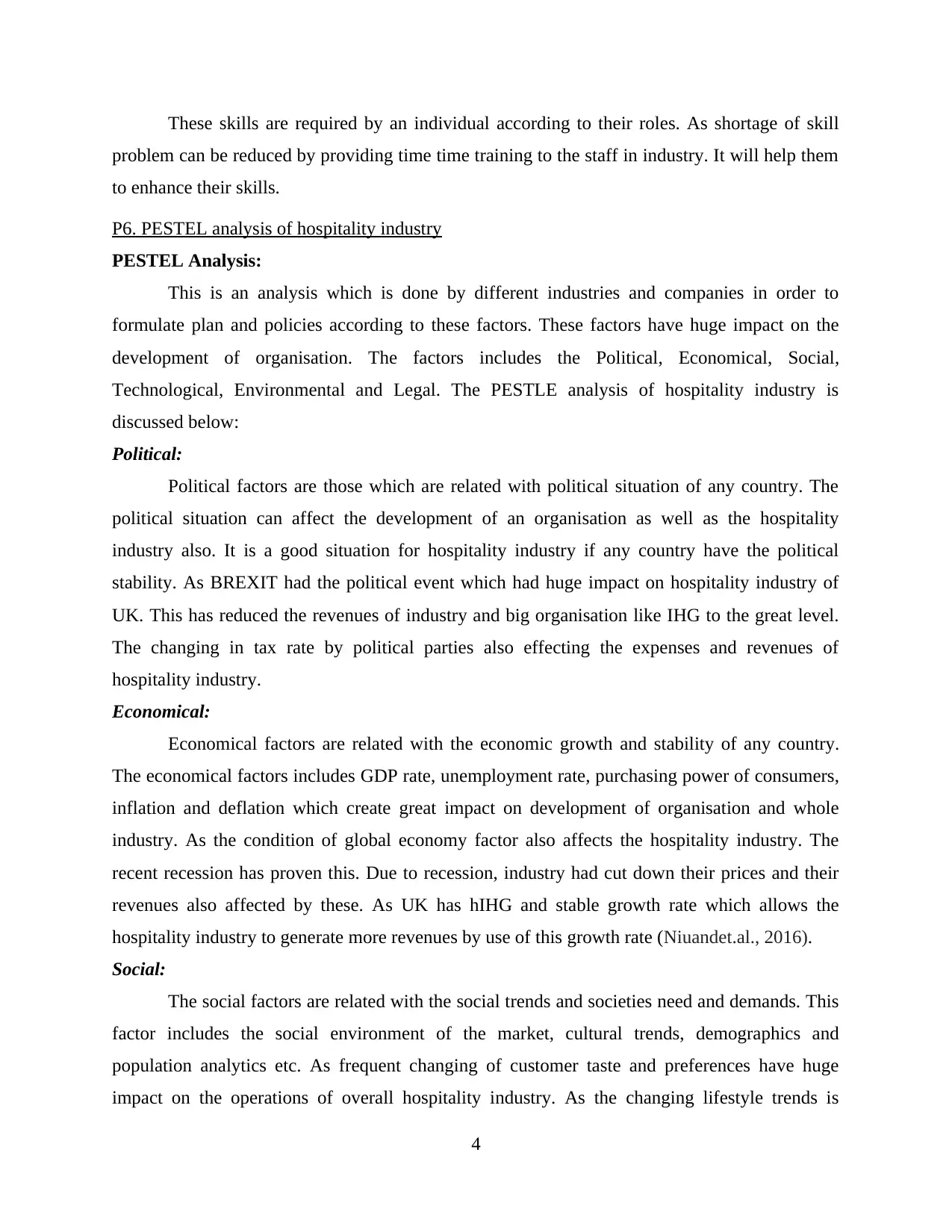
These skills are required by an individual according to their roles. As shortage of skill
problem can be reduced by providing time time training to the staff in industry. It will help them
to enhance their skills.
P6. PESTEL analysis of hospitality industry
PESTEL Analysis:
This is an analysis which is done by different industries and companies in order to
formulate plan and policies according to these factors. These factors have huge impact on the
development of organisation. The factors includes the Political, Economical, Social,
Technological, Environmental and Legal. The PESTLE analysis of hospitality industry is
discussed below:
Political:
Political factors are those which are related with political situation of any country. The
political situation can affect the development of an organisation as well as the hospitality
industry also. It is a good situation for hospitality industry if any country have the political
stability. As BREXIT had the political event which had huge impact on hospitality industry of
UK. This has reduced the revenues of industry and big organisation like IHG to the great level.
The changing in tax rate by political parties also effecting the expenses and revenues of
hospitality industry.
Economical:
Economical factors are related with the economic growth and stability of any country.
The economical factors includes GDP rate, unemployment rate, purchasing power of consumers,
inflation and deflation which create great impact on development of organisation and whole
industry. As the condition of global economy factor also affects the hospitality industry. The
recent recession has proven this. Due to recession, industry had cut down their prices and their
revenues also affected by these. As UK has hIHG and stable growth rate which allows the
hospitality industry to generate more revenues by use of this growth rate (Niuandet.al., 2016).
Social:
The social factors are related with the social trends and societies need and demands. This
factor includes the social environment of the market, cultural trends, demographics and
population analytics etc. As frequent changing of customer taste and preferences have huge
impact on the operations of overall hospitality industry. As the changing lifestyle trends is
4
problem can be reduced by providing time time training to the staff in industry. It will help them
to enhance their skills.
P6. PESTEL analysis of hospitality industry
PESTEL Analysis:
This is an analysis which is done by different industries and companies in order to
formulate plan and policies according to these factors. These factors have huge impact on the
development of organisation. The factors includes the Political, Economical, Social,
Technological, Environmental and Legal. The PESTLE analysis of hospitality industry is
discussed below:
Political:
Political factors are those which are related with political situation of any country. The
political situation can affect the development of an organisation as well as the hospitality
industry also. It is a good situation for hospitality industry if any country have the political
stability. As BREXIT had the political event which had huge impact on hospitality industry of
UK. This has reduced the revenues of industry and big organisation like IHG to the great level.
The changing in tax rate by political parties also effecting the expenses and revenues of
hospitality industry.
Economical:
Economical factors are related with the economic growth and stability of any country.
The economical factors includes GDP rate, unemployment rate, purchasing power of consumers,
inflation and deflation which create great impact on development of organisation and whole
industry. As the condition of global economy factor also affects the hospitality industry. The
recent recession has proven this. Due to recession, industry had cut down their prices and their
revenues also affected by these. As UK has hIHG and stable growth rate which allows the
hospitality industry to generate more revenues by use of this growth rate (Niuandet.al., 2016).
Social:
The social factors are related with the social trends and societies need and demands. This
factor includes the social environment of the market, cultural trends, demographics and
population analytics etc. As frequent changing of customer taste and preferences have huge
impact on the operations of overall hospitality industry. As the changing lifestyle trends is
4
⊘ This is a preview!⊘
Do you want full access?
Subscribe today to unlock all pages.

Trusted by 1+ million students worldwide
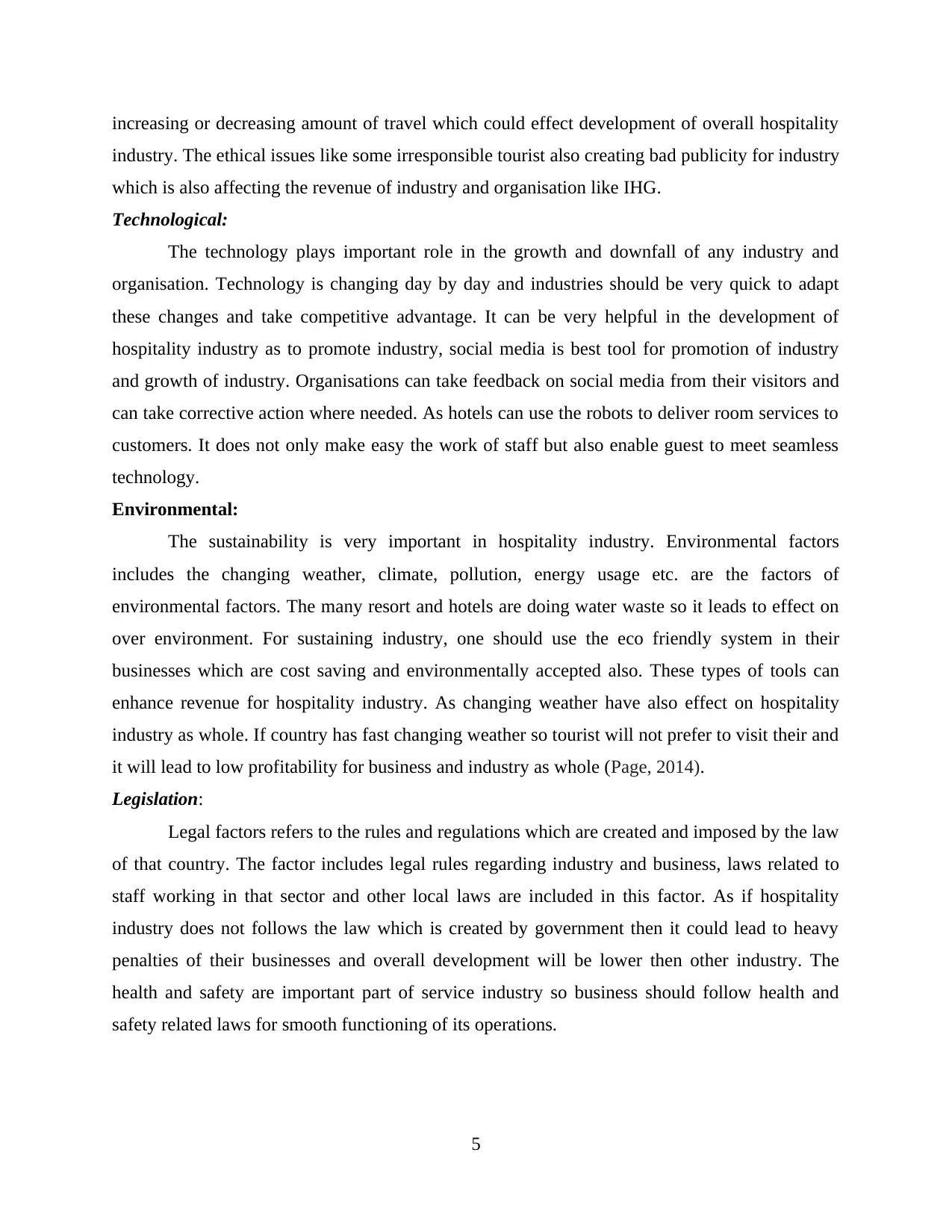
increasing or decreasing amount of travel which could effect development of overall hospitality
industry. The ethical issues like some irresponsible tourist also creating bad publicity for industry
which is also affecting the revenue of industry and organisation like IHG.
Technological:
The technology plays important role in the growth and downfall of any industry and
organisation. Technology is changing day by day and industries should be very quick to adapt
these changes and take competitive advantage. It can be very helpful in the development of
hospitality industry as to promote industry, social media is best tool for promotion of industry
and growth of industry. Organisations can take feedback on social media from their visitors and
can take corrective action where needed. As hotels can use the robots to deliver room services to
customers. It does not only make easy the work of staff but also enable guest to meet seamless
technology.
Environmental:
The sustainability is very important in hospitality industry. Environmental factors
includes the changing weather, climate, pollution, energy usage etc. are the factors of
environmental factors. The many resort and hotels are doing water waste so it leads to effect on
over environment. For sustaining industry, one should use the eco friendly system in their
businesses which are cost saving and environmentally accepted also. These types of tools can
enhance revenue for hospitality industry. As changing weather have also effect on hospitality
industry as whole. If country has fast changing weather so tourist will not prefer to visit their and
it will lead to low profitability for business and industry as whole (Page, 2014).
Legislation:
Legal factors refers to the rules and regulations which are created and imposed by the law
of that country. The factor includes legal rules regarding industry and business, laws related to
staff working in that sector and other local laws are included in this factor. As if hospitality
industry does not follows the law which is created by government then it could lead to heavy
penalties of their businesses and overall development will be lower then other industry. The
health and safety are important part of service industry so business should follow health and
safety related laws for smooth functioning of its operations.
5
industry. The ethical issues like some irresponsible tourist also creating bad publicity for industry
which is also affecting the revenue of industry and organisation like IHG.
Technological:
The technology plays important role in the growth and downfall of any industry and
organisation. Technology is changing day by day and industries should be very quick to adapt
these changes and take competitive advantage. It can be very helpful in the development of
hospitality industry as to promote industry, social media is best tool for promotion of industry
and growth of industry. Organisations can take feedback on social media from their visitors and
can take corrective action where needed. As hotels can use the robots to deliver room services to
customers. It does not only make easy the work of staff but also enable guest to meet seamless
technology.
Environmental:
The sustainability is very important in hospitality industry. Environmental factors
includes the changing weather, climate, pollution, energy usage etc. are the factors of
environmental factors. The many resort and hotels are doing water waste so it leads to effect on
over environment. For sustaining industry, one should use the eco friendly system in their
businesses which are cost saving and environmentally accepted also. These types of tools can
enhance revenue for hospitality industry. As changing weather have also effect on hospitality
industry as whole. If country has fast changing weather so tourist will not prefer to visit their and
it will lead to low profitability for business and industry as whole (Page, 2014).
Legislation:
Legal factors refers to the rules and regulations which are created and imposed by the law
of that country. The factor includes legal rules regarding industry and business, laws related to
staff working in that sector and other local laws are included in this factor. As if hospitality
industry does not follows the law which is created by government then it could lead to heavy
penalties of their businesses and overall development will be lower then other industry. The
health and safety are important part of service industry so business should follow health and
safety related laws for smooth functioning of its operations.
5
Paraphrase This Document
Need a fresh take? Get an instant paraphrase of this document with our AI Paraphraser
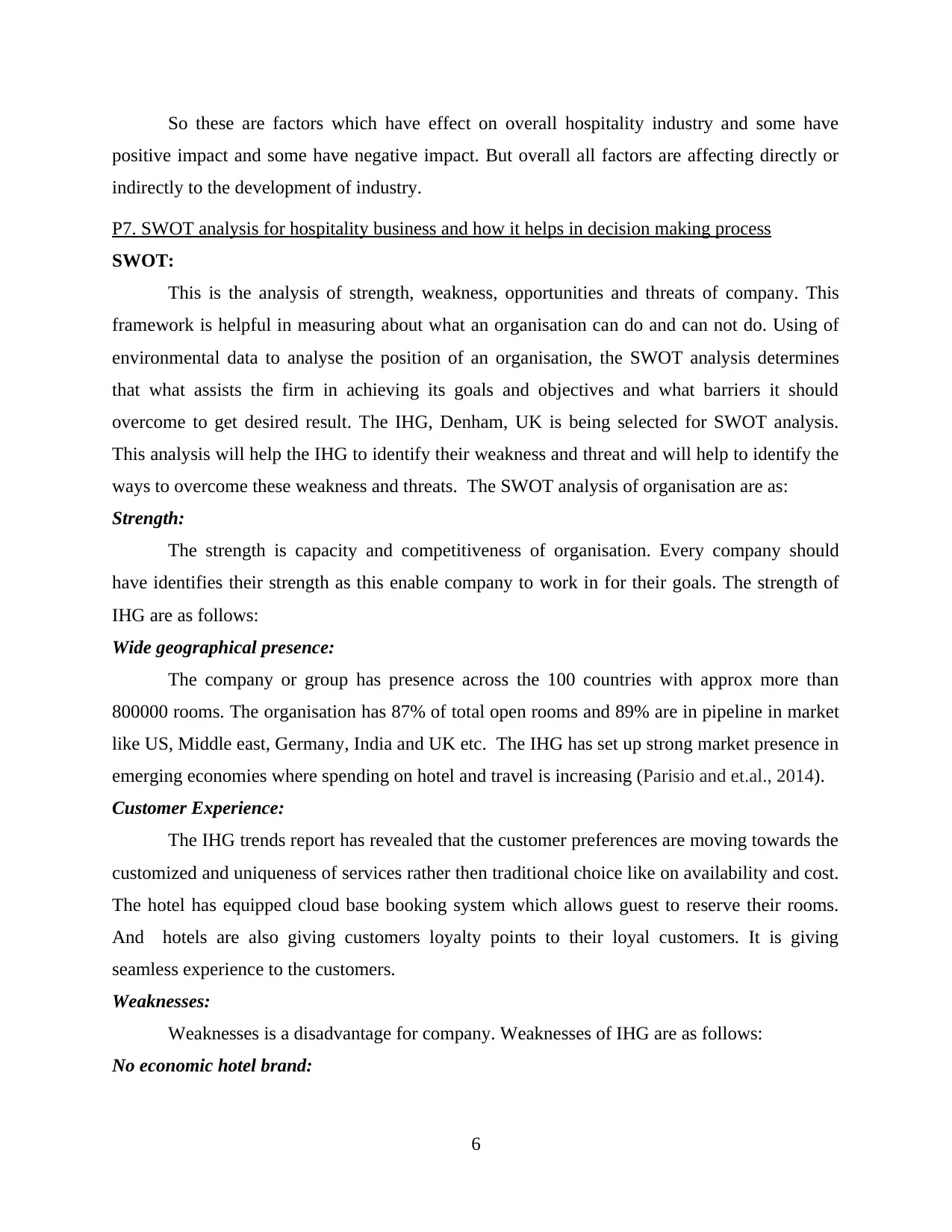
So these are factors which have effect on overall hospitality industry and some have
positive impact and some have negative impact. But overall all factors are affecting directly or
indirectly to the development of industry.
P7. SWOT analysis for hospitality business and how it helps in decision making process
SWOT:
This is the analysis of strength, weakness, opportunities and threats of company. This
framework is helpful in measuring about what an organisation can do and can not do. Using of
environmental data to analyse the position of an organisation, the SWOT analysis determines
that what assists the firm in achieving its goals and objectives and what barriers it should
overcome to get desired result. The IHG, Denham, UK is being selected for SWOT analysis.
This analysis will help the IHG to identify their weakness and threat and will help to identify the
ways to overcome these weakness and threats. The SWOT analysis of organisation are as:
Strength:
The strength is capacity and competitiveness of organisation. Every company should
have identifies their strength as this enable company to work in for their goals. The strength of
IHG are as follows:
Wide geographical presence:
The company or group has presence across the 100 countries with approx more than
800000 rooms. The organisation has 87% of total open rooms and 89% are in pipeline in market
like US, Middle east, Germany, India and UK etc. The IHG has set up strong market presence in
emerging economies where spending on hotel and travel is increasing (Parisio and et.al., 2014).
Customer Experience:
The IHG trends report has revealed that the customer preferences are moving towards the
customized and uniqueness of services rather then traditional choice like on availability and cost.
The hotel has equipped cloud base booking system which allows guest to reserve their rooms.
And hotels are also giving customers loyalty points to their loyal customers. It is giving
seamless experience to the customers.
Weaknesses:
Weaknesses is a disadvantage for company. Weaknesses of IHG are as follows:
No economic hotel brand:
6
positive impact and some have negative impact. But overall all factors are affecting directly or
indirectly to the development of industry.
P7. SWOT analysis for hospitality business and how it helps in decision making process
SWOT:
This is the analysis of strength, weakness, opportunities and threats of company. This
framework is helpful in measuring about what an organisation can do and can not do. Using of
environmental data to analyse the position of an organisation, the SWOT analysis determines
that what assists the firm in achieving its goals and objectives and what barriers it should
overcome to get desired result. The IHG, Denham, UK is being selected for SWOT analysis.
This analysis will help the IHG to identify their weakness and threat and will help to identify the
ways to overcome these weakness and threats. The SWOT analysis of organisation are as:
Strength:
The strength is capacity and competitiveness of organisation. Every company should
have identifies their strength as this enable company to work in for their goals. The strength of
IHG are as follows:
Wide geographical presence:
The company or group has presence across the 100 countries with approx more than
800000 rooms. The organisation has 87% of total open rooms and 89% are in pipeline in market
like US, Middle east, Germany, India and UK etc. The IHG has set up strong market presence in
emerging economies where spending on hotel and travel is increasing (Parisio and et.al., 2014).
Customer Experience:
The IHG trends report has revealed that the customer preferences are moving towards the
customized and uniqueness of services rather then traditional choice like on availability and cost.
The hotel has equipped cloud base booking system which allows guest to reserve their rooms.
And hotels are also giving customers loyalty points to their loyal customers. It is giving
seamless experience to the customers.
Weaknesses:
Weaknesses is a disadvantage for company. Weaknesses of IHG are as follows:
No economic hotel brand:
6
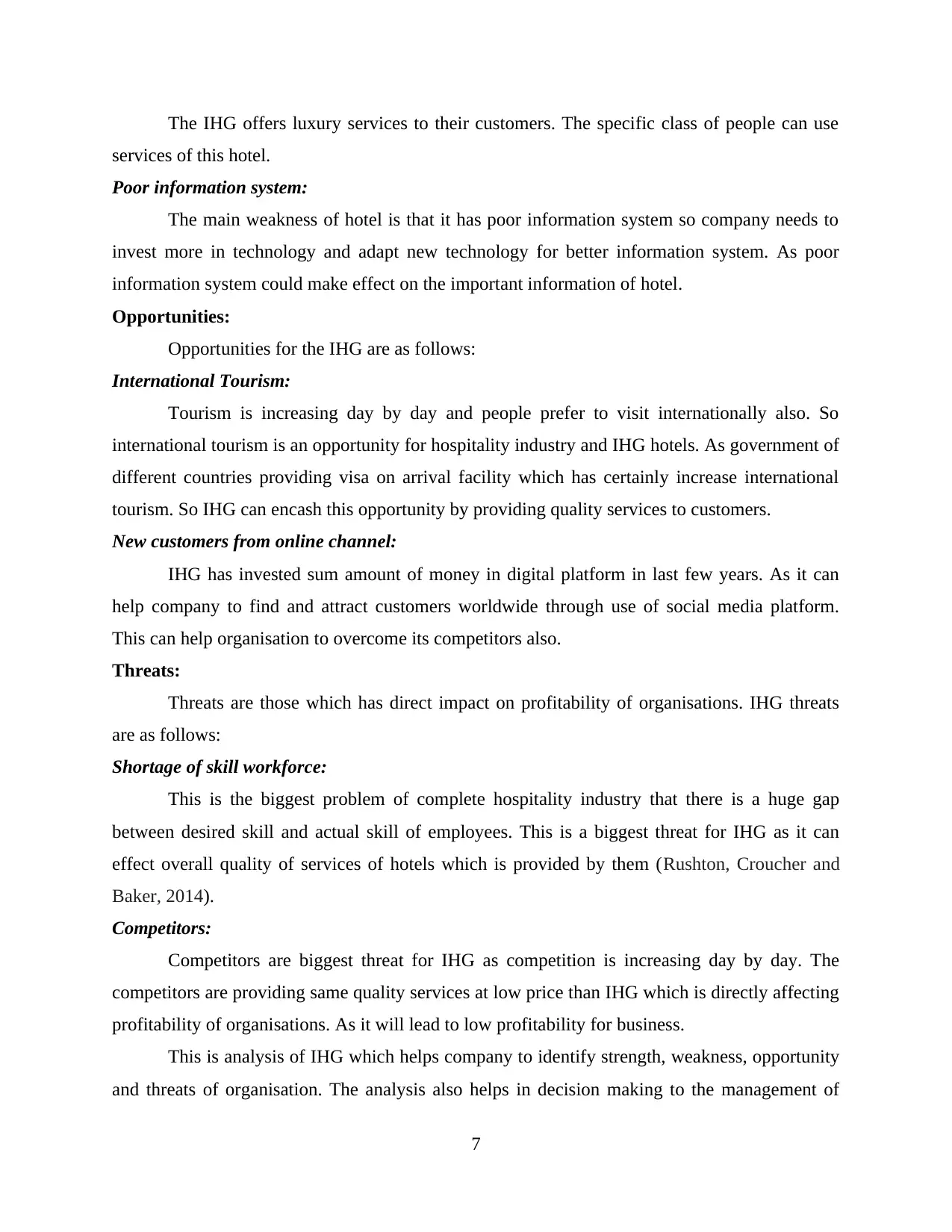
The IHG offers luxury services to their customers. The specific class of people can use
services of this hotel.
Poor information system:
The main weakness of hotel is that it has poor information system so company needs to
invest more in technology and adapt new technology for better information system. As poor
information system could make effect on the important information of hotel.
Opportunities:
Opportunities for the IHG are as follows:
International Tourism:
Tourism is increasing day by day and people prefer to visit internationally also. So
international tourism is an opportunity for hospitality industry and IHG hotels. As government of
different countries providing visa on arrival facility which has certainly increase international
tourism. So IHG can encash this opportunity by providing quality services to customers.
New customers from online channel:
IHG has invested sum amount of money in digital platform in last few years. As it can
help company to find and attract customers worldwide through use of social media platform.
This can help organisation to overcome its competitors also.
Threats:
Threats are those which has direct impact on profitability of organisations. IHG threats
are as follows:
Shortage of skill workforce:
This is the biggest problem of complete hospitality industry that there is a huge gap
between desired skill and actual skill of employees. This is a biggest threat for IHG as it can
effect overall quality of services of hotels which is provided by them (Rushton, Croucher and
Baker, 2014).
Competitors:
Competitors are biggest threat for IHG as competition is increasing day by day. The
competitors are providing same quality services at low price than IHG which is directly affecting
profitability of organisations. As it will lead to low profitability for business.
This is analysis of IHG which helps company to identify strength, weakness, opportunity
and threats of organisation. The analysis also helps in decision making to the management of
7
services of this hotel.
Poor information system:
The main weakness of hotel is that it has poor information system so company needs to
invest more in technology and adapt new technology for better information system. As poor
information system could make effect on the important information of hotel.
Opportunities:
Opportunities for the IHG are as follows:
International Tourism:
Tourism is increasing day by day and people prefer to visit internationally also. So
international tourism is an opportunity for hospitality industry and IHG hotels. As government of
different countries providing visa on arrival facility which has certainly increase international
tourism. So IHG can encash this opportunity by providing quality services to customers.
New customers from online channel:
IHG has invested sum amount of money in digital platform in last few years. As it can
help company to find and attract customers worldwide through use of social media platform.
This can help organisation to overcome its competitors also.
Threats:
Threats are those which has direct impact on profitability of organisations. IHG threats
are as follows:
Shortage of skill workforce:
This is the biggest problem of complete hospitality industry that there is a huge gap
between desired skill and actual skill of employees. This is a biggest threat for IHG as it can
effect overall quality of services of hotels which is provided by them (Rushton, Croucher and
Baker, 2014).
Competitors:
Competitors are biggest threat for IHG as competition is increasing day by day. The
competitors are providing same quality services at low price than IHG which is directly affecting
profitability of organisations. As it will lead to low profitability for business.
This is analysis of IHG which helps company to identify strength, weakness, opportunity
and threats of organisation. The analysis also helps in decision making to the management of
7
⊘ This is a preview!⊘
Do you want full access?
Subscribe today to unlock all pages.

Trusted by 1+ million students worldwide
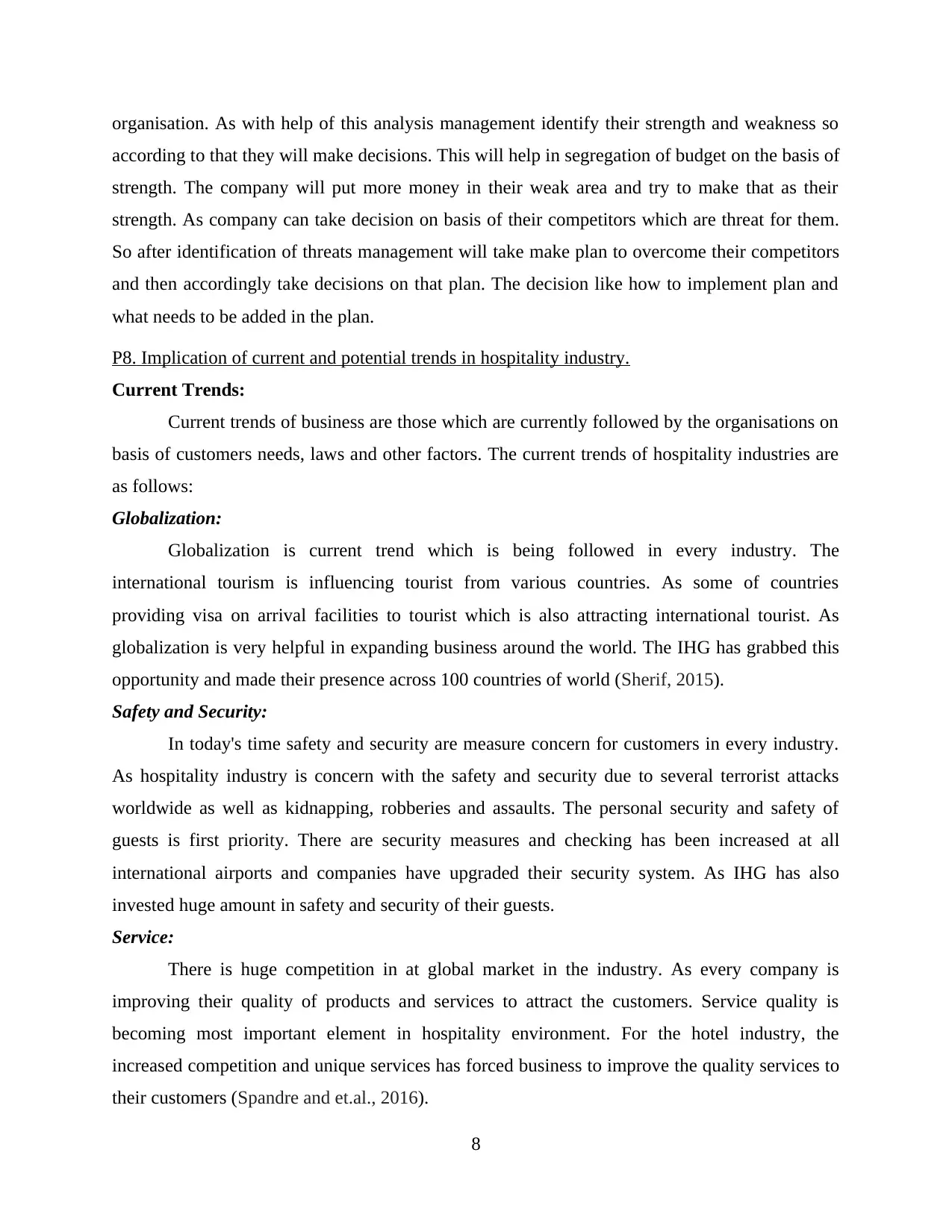
organisation. As with help of this analysis management identify their strength and weakness so
according to that they will make decisions. This will help in segregation of budget on the basis of
strength. The company will put more money in their weak area and try to make that as their
strength. As company can take decision on basis of their competitors which are threat for them.
So after identification of threats management will take make plan to overcome their competitors
and then accordingly take decisions on that plan. The decision like how to implement plan and
what needs to be added in the plan.
P8. Implication of current and potential trends in hospitality industry.
Current Trends:
Current trends of business are those which are currently followed by the organisations on
basis of customers needs, laws and other factors. The current trends of hospitality industries are
as follows:
Globalization:
Globalization is current trend which is being followed in every industry. The
international tourism is influencing tourist from various countries. As some of countries
providing visa on arrival facilities to tourist which is also attracting international tourist. As
globalization is very helpful in expanding business around the world. The IHG has grabbed this
opportunity and made their presence across 100 countries of world (Sherif, 2015).
Safety and Security:
In today's time safety and security are measure concern for customers in every industry.
As hospitality industry is concern with the safety and security due to several terrorist attacks
worldwide as well as kidnapping, robberies and assaults. The personal security and safety of
guests is first priority. There are security measures and checking has been increased at all
international airports and companies have upgraded their security system. As IHG has also
invested huge amount in safety and security of their guests.
Service:
There is huge competition in at global market in the industry. As every company is
improving their quality of products and services to attract the customers. Service quality is
becoming most important element in hospitality environment. For the hotel industry, the
increased competition and unique services has forced business to improve the quality services to
their customers (Spandre and et.al., 2016).
8
according to that they will make decisions. This will help in segregation of budget on the basis of
strength. The company will put more money in their weak area and try to make that as their
strength. As company can take decision on basis of their competitors which are threat for them.
So after identification of threats management will take make plan to overcome their competitors
and then accordingly take decisions on that plan. The decision like how to implement plan and
what needs to be added in the plan.
P8. Implication of current and potential trends in hospitality industry.
Current Trends:
Current trends of business are those which are currently followed by the organisations on
basis of customers needs, laws and other factors. The current trends of hospitality industries are
as follows:
Globalization:
Globalization is current trend which is being followed in every industry. The
international tourism is influencing tourist from various countries. As some of countries
providing visa on arrival facilities to tourist which is also attracting international tourist. As
globalization is very helpful in expanding business around the world. The IHG has grabbed this
opportunity and made their presence across 100 countries of world (Sherif, 2015).
Safety and Security:
In today's time safety and security are measure concern for customers in every industry.
As hospitality industry is concern with the safety and security due to several terrorist attacks
worldwide as well as kidnapping, robberies and assaults. The personal security and safety of
guests is first priority. There are security measures and checking has been increased at all
international airports and companies have upgraded their security system. As IHG has also
invested huge amount in safety and security of their guests.
Service:
There is huge competition in at global market in the industry. As every company is
improving their quality of products and services to attract the customers. Service quality is
becoming most important element in hospitality environment. For the hotel industry, the
increased competition and unique services has forced business to improve the quality services to
their customers (Spandre and et.al., 2016).
8
Paraphrase This Document
Need a fresh take? Get an instant paraphrase of this document with our AI Paraphraser
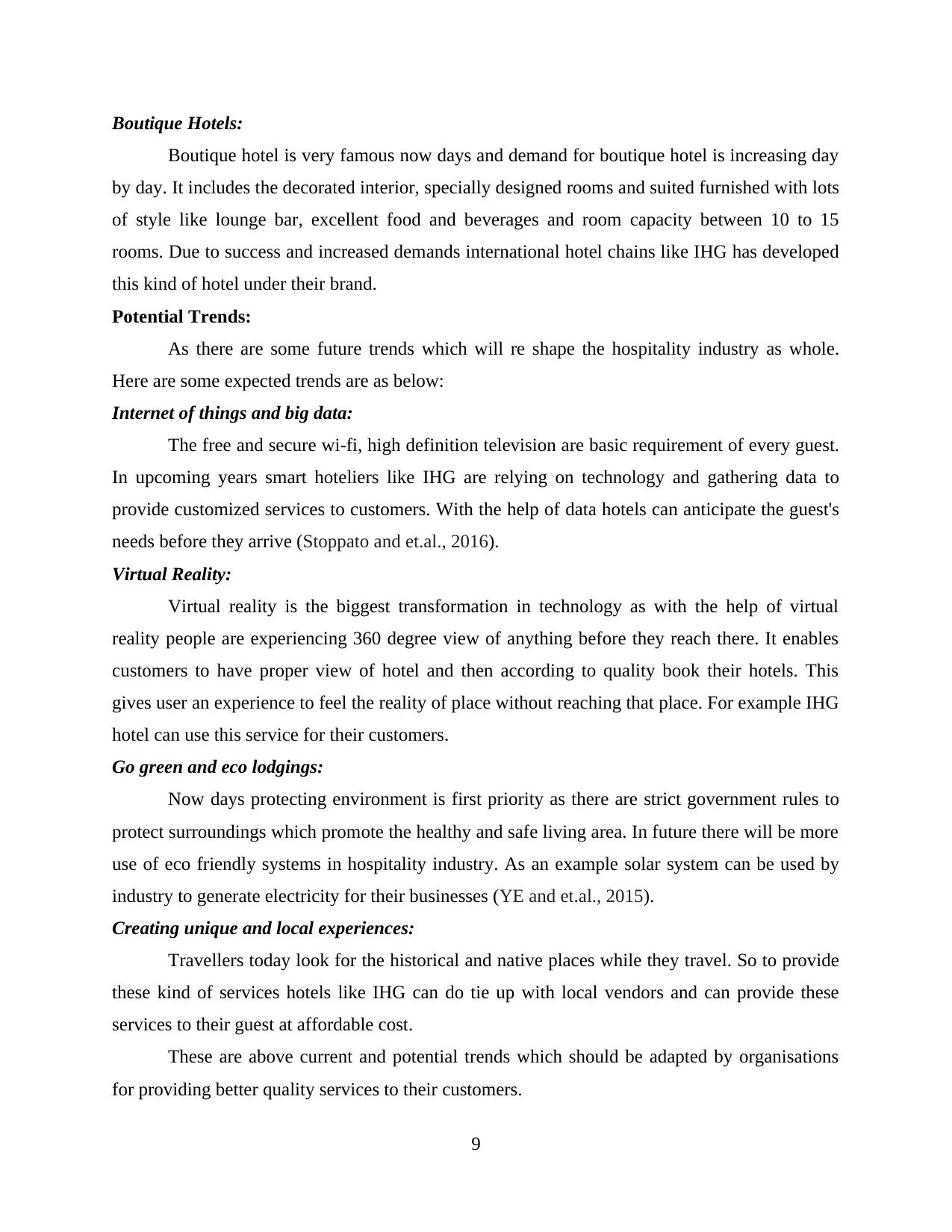
Boutique Hotels:
Boutique hotel is very famous now days and demand for boutique hotel is increasing day
by day. It includes the decorated interior, specially designed rooms and suited furnished with lots
of style like lounge bar, excellent food and beverages and room capacity between 10 to 15
rooms. Due to success and increased demands international hotel chains like IHG has developed
this kind of hotel under their brand.
Potential Trends:
As there are some future trends which will re shape the hospitality industry as whole.
Here are some expected trends are as below:
Internet of things and big data:
The free and secure wi-fi, high definition television are basic requirement of every guest.
In upcoming years smart hoteliers like IHG are relying on technology and gathering data to
provide customized services to customers. With the help of data hotels can anticipate the guest's
needs before they arrive (Stoppato and et.al., 2016).
Virtual Reality:
Virtual reality is the biggest transformation in technology as with the help of virtual
reality people are experiencing 360 degree view of anything before they reach there. It enables
customers to have proper view of hotel and then according to quality book their hotels. This
gives user an experience to feel the reality of place without reaching that place. For example IHG
hotel can use this service for their customers.
Go green and eco lodgings:
Now days protecting environment is first priority as there are strict government rules to
protect surroundings which promote the healthy and safe living area. In future there will be more
use of eco friendly systems in hospitality industry. As an example solar system can be used by
industry to generate electricity for their businesses (YE and et.al., 2015).
Creating unique and local experiences:
Travellers today look for the historical and native places while they travel. So to provide
these kind of services hotels like IHG can do tie up with local vendors and can provide these
services to their guest at affordable cost.
These are above current and potential trends which should be adapted by organisations
for providing better quality services to their customers.
9
Boutique hotel is very famous now days and demand for boutique hotel is increasing day
by day. It includes the decorated interior, specially designed rooms and suited furnished with lots
of style like lounge bar, excellent food and beverages and room capacity between 10 to 15
rooms. Due to success and increased demands international hotel chains like IHG has developed
this kind of hotel under their brand.
Potential Trends:
As there are some future trends which will re shape the hospitality industry as whole.
Here are some expected trends are as below:
Internet of things and big data:
The free and secure wi-fi, high definition television are basic requirement of every guest.
In upcoming years smart hoteliers like IHG are relying on technology and gathering data to
provide customized services to customers. With the help of data hotels can anticipate the guest's
needs before they arrive (Stoppato and et.al., 2016).
Virtual Reality:
Virtual reality is the biggest transformation in technology as with the help of virtual
reality people are experiencing 360 degree view of anything before they reach there. It enables
customers to have proper view of hotel and then according to quality book their hotels. This
gives user an experience to feel the reality of place without reaching that place. For example IHG
hotel can use this service for their customers.
Go green and eco lodgings:
Now days protecting environment is first priority as there are strict government rules to
protect surroundings which promote the healthy and safe living area. In future there will be more
use of eco friendly systems in hospitality industry. As an example solar system can be used by
industry to generate electricity for their businesses (YE and et.al., 2015).
Creating unique and local experiences:
Travellers today look for the historical and native places while they travel. So to provide
these kind of services hotels like IHG can do tie up with local vendors and can provide these
services to their guest at affordable cost.
These are above current and potential trends which should be adapted by organisations
for providing better quality services to their customers.
9
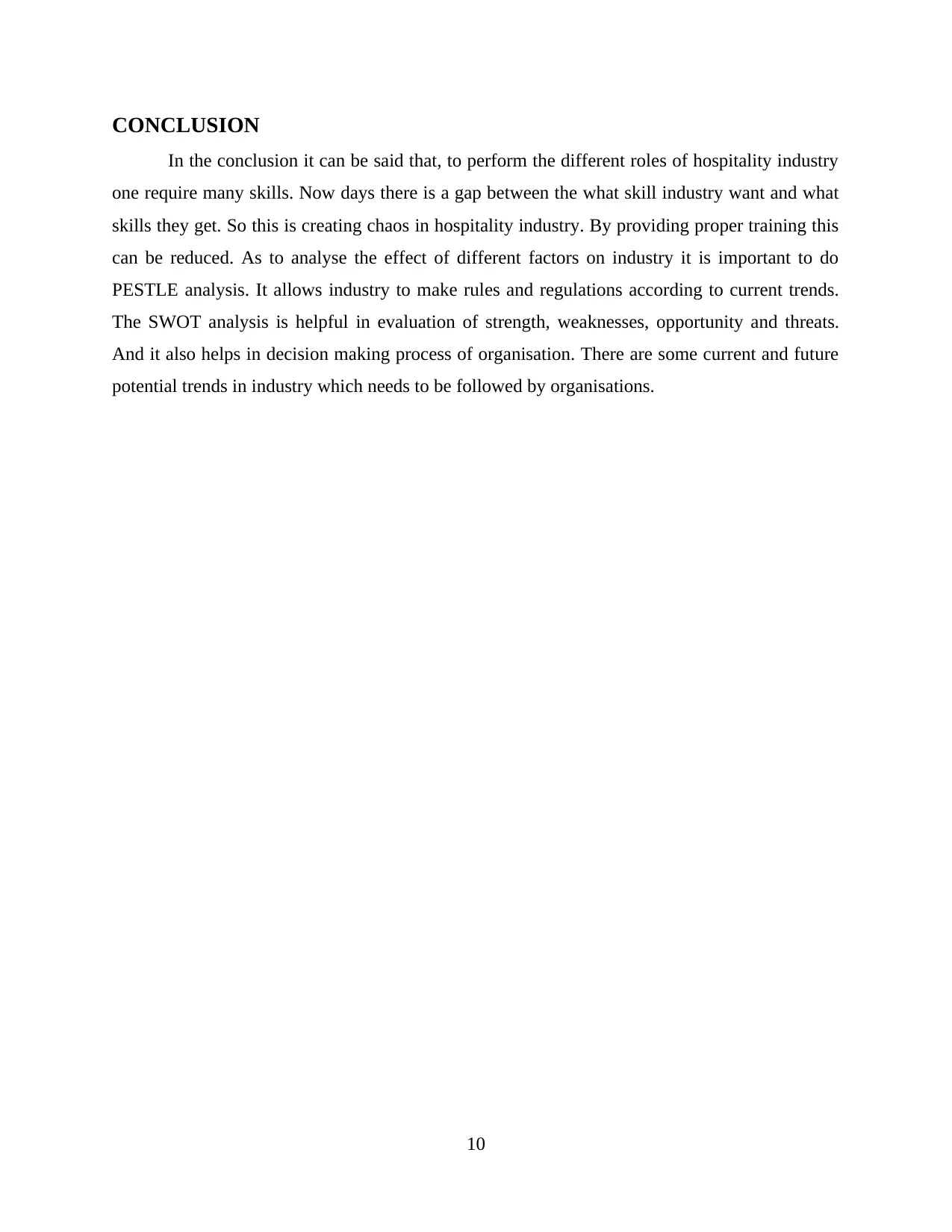
CONCLUSION
In the conclusion it can be said that, to perform the different roles of hospitality industry
one require many skills. Now days there is a gap between the what skill industry want and what
skills they get. So this is creating chaos in hospitality industry. By providing proper training this
can be reduced. As to analyse the effect of different factors on industry it is important to do
PESTLE analysis. It allows industry to make rules and regulations according to current trends.
The SWOT analysis is helpful in evaluation of strength, weaknesses, opportunity and threats.
And it also helps in decision making process of organisation. There are some current and future
potential trends in industry which needs to be followed by organisations.
10
In the conclusion it can be said that, to perform the different roles of hospitality industry
one require many skills. Now days there is a gap between the what skill industry want and what
skills they get. So this is creating chaos in hospitality industry. By providing proper training this
can be reduced. As to analyse the effect of different factors on industry it is important to do
PESTLE analysis. It allows industry to make rules and regulations according to current trends.
The SWOT analysis is helpful in evaluation of strength, weaknesses, opportunity and threats.
And it also helps in decision making process of organisation. There are some current and future
potential trends in industry which needs to be followed by organisations.
10
⊘ This is a preview!⊘
Do you want full access?
Subscribe today to unlock all pages.

Trusted by 1+ million students worldwide
1 out of 13
Related Documents
Your All-in-One AI-Powered Toolkit for Academic Success.
+13062052269
info@desklib.com
Available 24*7 on WhatsApp / Email
![[object Object]](/_next/static/media/star-bottom.7253800d.svg)
Unlock your academic potential
Copyright © 2020–2025 A2Z Services. All Rights Reserved. Developed and managed by ZUCOL.




